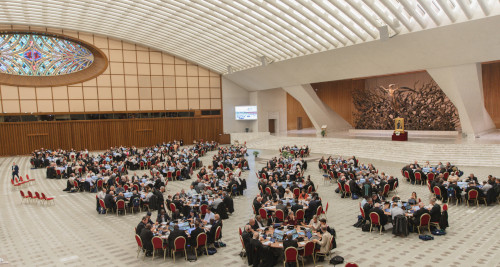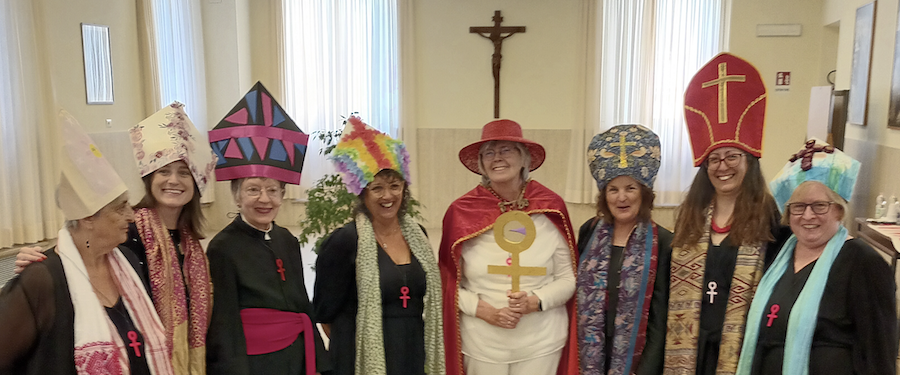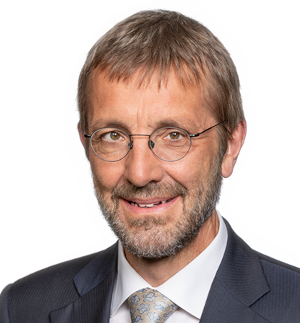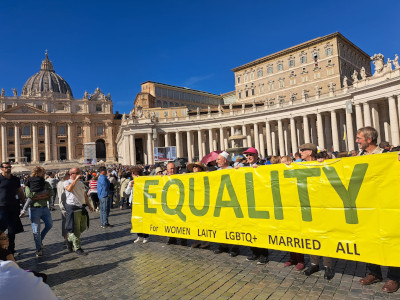We are Church - Germany at the conclusion of the World Synod
Post release: We are Church - Germany welcomes Pope Francis' statement: ‘... For this reason, I do not intend to publish a ‘post-synodal apostolic exhortation’ ... in the light of what has emerged from the synodal path, there are and will be decisions that need to be taken.’ > Wording: Pope's final address to the synod
Press release, Rome/Munich, 26 October 2024

We are Church - Germany draws a mixed conclusion from the conclusion of the XVI Ordinary General Assembly of the Synod of Bishops, on whose final document will be voted today, and calls for genuine and concrete synodality at all levels of the church.
With the synodal process with worldwide participation, including at the grassroots level of the church, Pope Francis has made a church-historical turnaround that builds on the baptismal dignity of all, will have a long-term effect and be irreversible. But even at this second session, it has not yet been possible to resolve the clear contradiction between the early Christian message of the equality of all believers (‘Equality’) and the current dogmatically entrenched church power structure. This applies particularly to the exclusion of women, who had a central role in the early church, from all ordained ministries.
Unresolved ‘women's issue’ shows the power problem of the men's church
The worldwide exposure of the spiritual and sexual abuse of power and its cover-up has led the Catholic Church into a deep existential crisis. However, the Roman Catholic Church is also in a constitutional crisis because, after the Second Vatican Council, the right of the episcopate was overemphasised and the right of the people of the church was underemphasised and women's rights are not recognised. The Catholic Church's traditional Christian view of humanity is no longer convincing either. It will not be enough to strengthen the role of women only within the existing canon law if only men continue to define the role of women.
The highly non-transparent approach of the Pope and the new Prefect of the Dicastery for the Doctrine of the Faith, Cardinal Víctor Manuel Fernández, to the ‘women's issue’ is unsynodal and has lost a great deal of trust, but has also triggered strong opposition. The continuing discrimination against women shows how little respect there is for the baptismal dignity of women and how the traditional, male-dominated power structures are being held on to instead. The legacies of the previous Popes, ‘Inter Insignores’ (1976), ‘Mulieris dignitatem’ (1988) and ‘Ordinatio Sacerdotalis’ (1994), still weigh heavily on the Church today.
From now on, synodality must be practised in a concrete way at all levels of the Church!
For the synod members, the two assemblies in Rome were an intensive learning process, which must now be courageously implemented in Rome and in the individual local churches and later also evaluated.
From now on, the investigation and prevention of sexualised violence must be made a ‘matter for the boss’ everywhere.
From now on, the churchgoers are to be responsibly involved in all essential decisions at the respective levels. Transparency and accountability apply not only to the Pope, but to all believers.
From now on, synodal structures are to be created at the country and continental level, as is already successfully practised in Latin America and Asia. Here, Europe in particular has a lot of catching up to do.
From now on, decentralised solutions are to be allowed in all pastoral matters that correspond to the respective cultural context and are indispensable for an inculturation of the faith.
From now on, the Roman study groups must incorporate the current state of theological research in a transparent manner and include current pastoral requirements.
From now on, the synodal path in Germany, which has been given a tailwind by the deliberations in Rome, must be continued unabated.
From now on, the diaconal work of the church in following Jesus must be brought to the centre. This concerns everyone, men and women.
From now on, the church must not only concern itself with itself. It must change because it has a mission in the world (cf. Council Decree ‘Gaudium et Spes’).
Second Council session on 16 November 2024 in Stuttgart
We Are Church - Germany has critically followed the synodal path in Germany as well as the worldwide synodal process from the beginning. We Are Church - Germany sees it as a success that the reform issues formulated in Austria after the 1995 abuse scandal in Vienna around Cardinal Hans Hermann Groër – participation, women's ministries, exemption of celibacy and sex education – are now finally being openly discussed in Germany and Rome.





 At the first session of the World Synod in October 2023, the topic of women's ordination was discussed intensively. In particular, it was decided to examine the possibility of admitting women to the diaconate and to put it on the agenda for the second session. Some, including the Chairman of the German Bishops' Conference, Bishop Bätzing, considered the diaconate for women to be achievable in the foreseeable future.
At the first session of the World Synod in October 2023, the topic of women's ordination was discussed intensively. In particular, it was decided to examine the possibility of admitting women to the diaconate and to put it on the agenda for the second session. Some, including the Chairman of the German Bishops' Conference, Bishop Bätzing, considered the diaconate for women to be achievable in the foreseeable future.